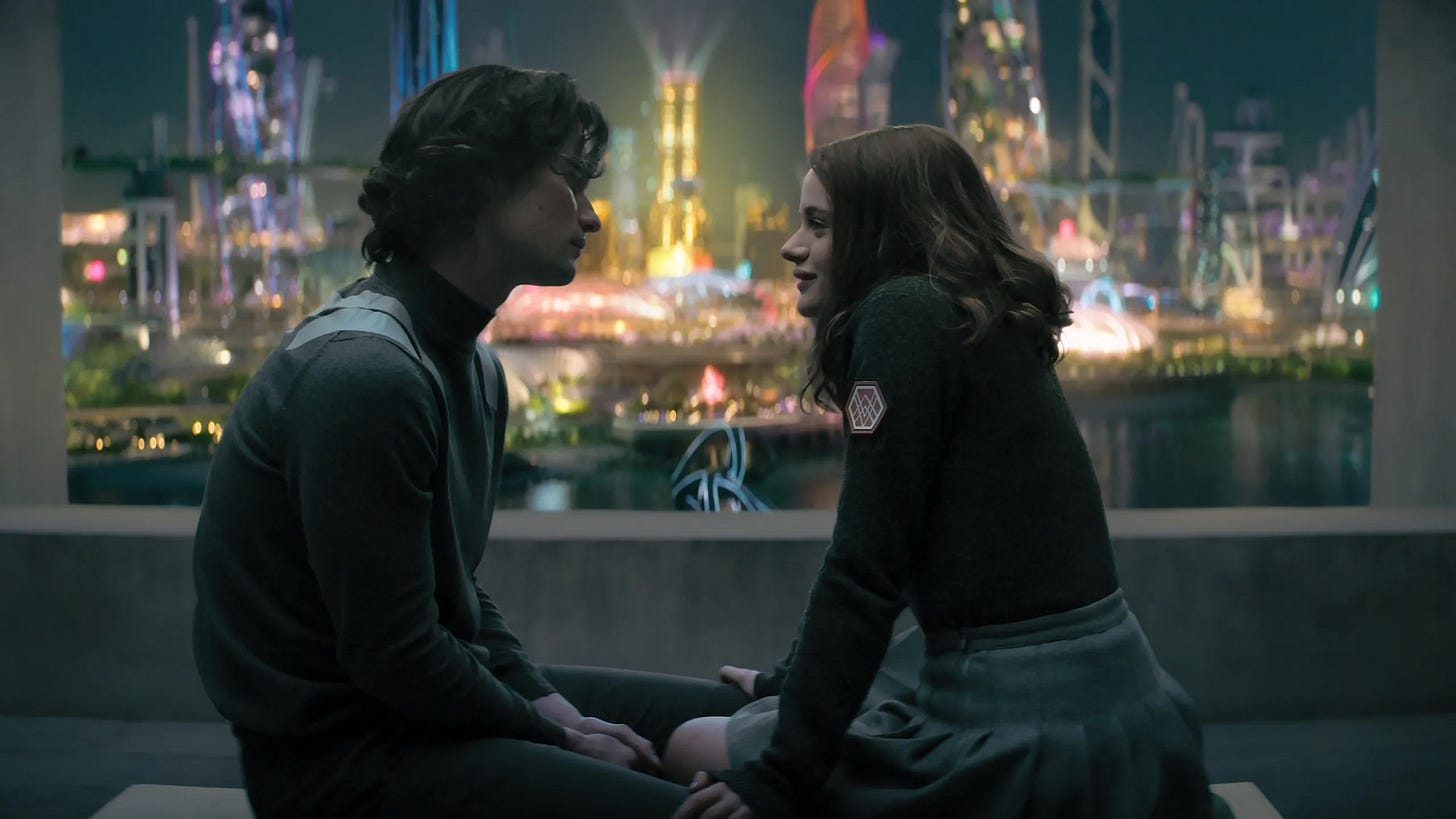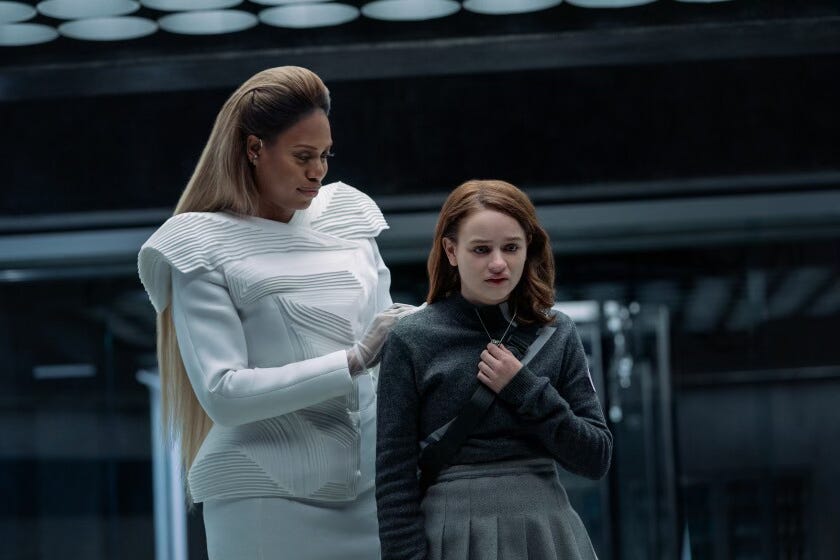The Death of YA Dystopian Film Adaptations
Why Netflix's Uglies didn't create the same online impact like The Hunger Games and Divergent
You’re sitting in the theaters wearing an overpriced sweatshirt from Hot Topic with a large bucket of popcorn on your lap. Divergent is about to play on the screen, and your friends are whispering their excitement over Theo James— the new dystopian white boy of the year now that Josh Hutchinson has been dethroned. You’re young enough to parrot anti-government rhetoric you’ve read in young adult novels, but not old enough to vote. This period of limbo inspires you to consume more dystopian books, giving you something to believe in once you turn eighteen. Because, obviously, you can change the world at eighteen.
I read an abundance of young adult dystopian novels in the early 2010s. The Hunger Games was the first series I downloaded on an e-reader (and you can read more of my opinions of Suzanne Collins’ work here). I remember checking out other books like Veronica Roth’s Divergent, Ally Condie’s Matched, and my all time favorite Lauren Oliver’s Delirium. These trilogies are few of the many books that young adolescents read during the late 2000s into the early 2010s. I attribute this publishing trend to events like the Great Recession in 2008 and the Iraq War— serious stressors to America’s domestic economy and media. Others may say it goes even further back to tragedies such as September 11th and Hurricane Katrina. All of these traumatic milestones exposed the American government’s lack of structure and fueled skepticism for the future to come. Adults think children are too young to fully grasp what’s happening in the world around them, but YA authors begged to differ and began writing stories that serve as parallels to the world we’re currently living in today.
SPOILERS! SPOILERS! I AM WARNING YOU THAT THERE ARE SPOILERS!
On Friday afternoon, I watched Netflix’s new release Uglies— a film adaption of Scott Westerfeld’s young adult novel. I truthfully do not remember reading Westerfeld’s trilogy as a whole, but I can recall the premise vaguely. When I turned on the movie, it didn’t give me the same feeling of awe that movies like The Hunger Games and Divergent fed me as a teen. Joey King and Chase Stokes, both who have starred in major Netflix projects, greet the audience in a cold prison-cell of a dorm and lay out the current social situation they’re both in. As a viewer, I felt that the opening scene was a bit too on the nose to the formulaic approach that other dystopian films follows. Of course becoming a Pretty (done through a mandatory medical procedure given by the government to make one more conventionally attractive) is the best thing one can do and it clearly doesn’t have any consequences to society as a whole. And, of course, we should blindly trust the government officials who dress like Tesla trucks. What could possibly go wrong?
While I’m not a professional movie critic, I did watch the entire film and wrote down many thoughts. The first one I feel is the most important to bring to light is how this movie was released— through a streaming site.
Unlike other YA book film adaptations that I referenced earlier in this article, Uglies was released on Netflix, September 13th of this year. Many online writers and video essayists have noted the downfall of subscription culture and how many consumers are trying to break away from their paid streaming services. Releasing this movie on Netflix limits the viewership and separates the Uglies from being equally compared to other dystopian films that were released in theaters. Now, this isn’t to say that any dystopian movie distributed by Netflix is unwatchable. One recommendation that I love giving others is Netflix’s Spiderhead (2022)— a film adaptation of George Saunders’ short story “Escape from Spiderhead.” With a $100 million dollar budget, Chris Hemsworth and Eric Newman lure their audience to a fucked up island where prisoners are used as a test subjects for experiments that alter emotions. Highly recommend.
It’s unclear what the budget for Uglies was set at, but I would assume its numbers did not reach anywhere near the ones that were given for Divergent and The Hunger Games— both over $75 million for the first films in their respected series. The special effects were not that impressive and all the Pretties looked like they were plastered with the Bold Glamour filter from TikTok. Not every film needs a large budget, but every film should know how to use their budget wisely. And, unfortunately for the Uglies, it didn’t do the story justice.
Going back to what was briefly talked about earlier, I want to touch on the social impact of current events. Scott Westerfeld published Uglies in 2005. The audience that consumed his works in the late 2000s were not yet exposed to the peak of social media, the 2016 US Election, Covid-19, or the various genocides currently taking place today. The audience that now sit in front of their laptops and TVs today have witnessed these newsworthy events and are somewhat aware of the federal government’s power over the American people. The rise of progressive politics and anti-captialism make watching movies like Uglies a bit cringe. The superficial message falls flat in comparison to the real life shit working class people deal with in today’s time. Also, I think the beauty industry reinvented itself to be more pro-natural beauty in a way that works against framework in the Uglies.
I will note my favorite component of the movie was the casting of Laverne Cox as Dr. Cable— the antagonist in the series. Cox, most commonly known for her role in Netflix’s Orange is the New Black and her advocacy work within the transgender community, takes on a villainous role where her character strips away one’s rights to their own autonomy. This concept isn’t anything new, especially with the reversal of Roe v. Wade in 2022. Because of Laverne Cox’s platform, her casting sparks a whole other layer of the social dialogue in Uglies. Westerfeld’s story clearly pushes against the Eurocentric beauty agenda. However, I would argue, based on the film and casting of Laverne Cox, that Westerfeld is actually fighting for bodily autonomy. Just like how Shay actively chose to not undergo the mandatory cosmetic surgery, Laverne Cox chose to go forth with gender-affirming procedures that provided her more security as. person. It should be noted that when this book was published the conversations around beauty and gender identity were not as developed as they are today. But regardless, Uglies can still be interpreted in a way that still holds weight in present day conversations.
I don’t see Uglies standing up against the young-adult dystopian movies that came before. The youth today experience dystopian-like events every minute of their life. Rather than reaching for an audience that no longer exists, film directors should channel their energy into stories that go beyond the cliche motifs. Subject matter like the Climate Crisis would serve as a good foundation to build up a storyline. If studios are looking for dystopian books to adapt, Ling Ma’s Severance or Nick Fuller Googin’s The Great Transition (if you’re looking to incorporate a coming-of-age angle) would be perfect candidates to reignite this genre.





